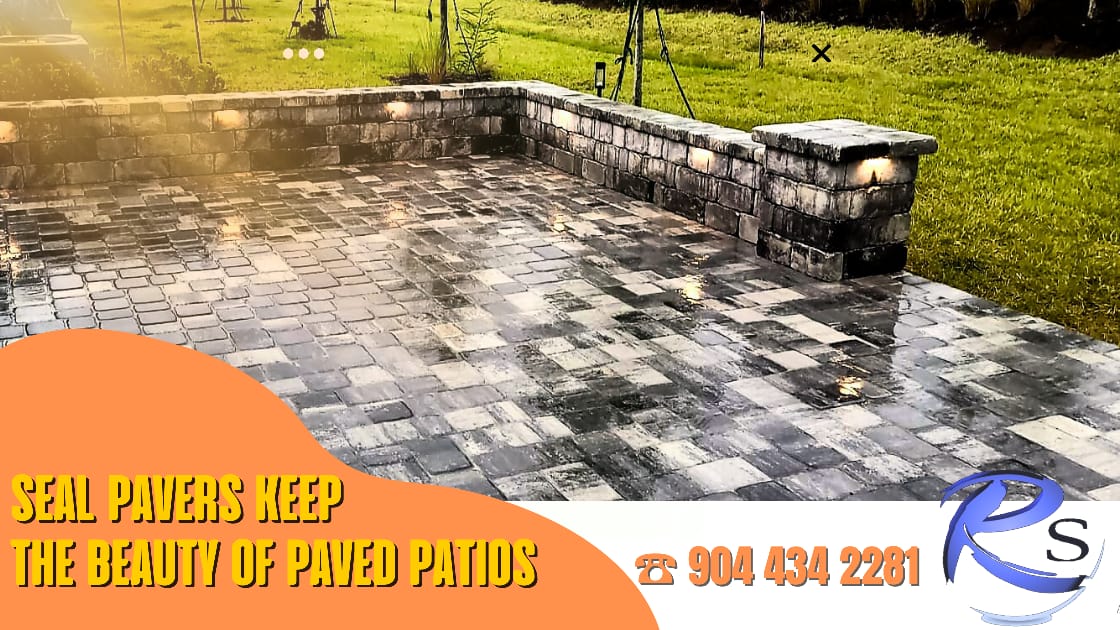Paved patios add beauty, style, and functionality to any outdoor space. They can transform a plain backyard into an inviting oasis for relaxation and entertainment. However, exposed to the elements, pavers Jacksonville can fade, become stained, or lose their luster over time. To combat these issues, many homeowners turn to sealing pavers as a solution.
The Benefits of Sealing Pavers
Sealing pavers offers several advantages that contribute to the longevity and aesthetic appeal of paved patios:
- Enhanced Appearance: Sealing pavers Jacksonville helps to bring out their natural colors, creating a vibrant and rich look. It can also give pavers a glossy or matte finish, depending on the desired aesthetic.
- Protection from Stains and Fading: Sealing pavers forms a protective barrier that resists oil, grease, and other stains. It also shields the surface from UV rays, which can cause pavers to fade or become discolored over time.
- Reduced Weed Growth: Sealed pavers can inhibit weed growth by preventing weed seeds from germinating and taking root in the joints between the pavers Jacksonville.
- Easier Maintenance: Sealed pavers are easier to clean and maintain. The sealant makes it more difficult for dirt, mold, and mildew to penetrate the surface, allowing for easier removal.
- Longer Lifespan: By protecting pavers from the elements, sealing can extend their lifespan. Sealed pavers Jacksonville are less prone to cracking, chipping, and spalling caused by freeze-thaw cycles or harsh weather conditions.
The Trade-Offs and Challenges
While sealing pavers Jacksonville offers numerous benefits, there are also trade-offs and challenges to consider:
- Expense: Sealing pavers can add to the initial cost of a patio installation or renovation project. Additionally, sealants need to be reapplied periodically, typically every 2-5 years, which incurs additional costs.
- Compatibility and Breathability: Choosing the right sealant for pavers Jacksonville is crucial. Some sealants may not be compatible with certain types of pavers, potentially causing discoloration or other undesirable effects. It is important to choose a breathable sealant that allows moisture to escape from the pavers to prevent damage.
- Application and Maintenance: Applying sealant to pavers requires meticulous preparation and application techniques. It can be labor-intensive, especially for larger patios, and improper application can result in uneven coverage or a cloudy appearance. Regular maintenance, such as cleaning and resealing, is also required to keep the pavers Jacksonville in optimal condition.
- Natural Look vs. Enhanced Look: Sealing pavers can alter their appearance. Some homeowners prefer the natural and weathered look of unsealed pavers, while others prefer the enhanced colors and sheen offered by sealants. Choosing whether or not to seal pavers ultimately comes down to personal preference and the desired aesthetic.
Sealing Pavers Jacksonville for Beauty and Longevity
When deciding whether to seal pavers Jacksonville for your patio, it is important to consider the specific needs of your outdoor space and your personal preferences.
If you want to maintain the vibrant colors, protect against stains, and simplify maintenance, sealing pavers is a worthwhile investment. It can significantly extend the life of your patio, keeping it looking fresh and beautiful for years to come.
However, if you prefer a more natural and weathered look, or if you have concerns about the expense and maintenance associated with sealing, leaving pavers Jacksonville unsealed may be a better choice.
Choosing the Right Sealant
When selecting a sealant for your paved patios, it is important to consider the specific characteristics of your patio and the sealant options available:
- Water-Based vs. Solvent-Based Sealants: Water-based sealants are generally more eco-friendly and easier to apply, but they may not be as durable or long-lasting as solvent-based sealants. Solvent-based sealants offer greater resistance to stains and can provide a glossy finish.
- Penetrating vs. Topical Sealants: Penetrating sealants are absorbed into the pavers, forming a protective barrier from within. They allow for moisture vapor to escape and retain the natural texture of the pavers Jacksonville. Topical sealants, on the other hand, form a film on the surface of the pavers and provide a more enhanced appearance.
- Sealant Sheen: Depending on your desired aesthetic, you can choose a sealant that provides a glossy, semi-gloss, satin, or matte finish. Consider the overall style and design of your outdoor space when selecting the sheen of the sealant.
The Sealing Process
The process of sealing paved patios typically involves the following steps:
- Preparation: Thoroughly clean the pavers Jacksonville to remove any dirt, stains, or moss. Use a pressure washer or a scrub brush with a cleaner specifically designed for pavers. Allow the pavers to dry completely before applying the sealant.
- Application: Carefully follow the instructions provided by the sealant manufacturer. Ensure even coverage using a brush, roller, or sprayer. Take care to avoid applying too much sealant, as it may result in a sticky or cloudy surface.
- Curing: Allow the sealant to dry and cure according to the manufacturer’s instructions. Typically, it takes 24-48 hours for the sealant to fully cure, but this may vary depending on the type and brand of sealant.
Maintaining Sealed Paved patios
While sealed paved patios are generally easier to maintain, they still require regular care to prolong their lifespan and keep them looking their best:
- Cleaning: Regularly sweep or use a leaf blower to remove debris from the surface of the pavers Jacksonville. Occasional deep cleaning with a mild detergent and water can help remove stains or dirt buildup.
- Resealing: Over time, the sealant may wear off or become less effective. It is recommended to reapply the sealant every 2-5 years, or as needed, to maintain optimal protection and appearance. Before resealing, the pavers should be thoroughly cleaned and allowed to dry.
- Joint Maintenance: Inspect the joints between the pavers Jacksonville regularly. If you notice any weed growth or erosion, address these issues promptly. Consider applying a joint stabilizing sealer to minimize weed growth and prevent sand loss.
- Protection: Take precautions to protect the sealed pavers from heavy impacts or harsh chemicals. Avoid using de-icing salts on the surface during winter to prevent damage.
Making an Informed Decision
Deciding whether to seal your pavers Jacksonville requires weighing the benefits, costs, and personal preferences. Consider the climate and weather conditions in your area, the level of foot traffic on your patio, and the overall look you want to achieve. Consulting with a professional in patio installation and maintenance can provide valuable insights and guidance.
Remember, while sealing pavers can help keep the beauty of your paved patio intact, it is not the only option. Regular cleaning and maintenance can go a long way in preserving the appearance and functionality of your pavers Jacksonville.
Alternative Options for Paved patios Protection
Aside from sealing pavers, there are other options available to protect and maintain the beauty of your paved patio:
- Paver Treatments: Some manufacturers offer specialized treatments that can be applied to pavers Jacksonville to enhance their color and protect against stains. These treatments may require regular reapplication but can be an alternative to full-scale sealing.
- Paver Mats and Covers: If you want to protect your pavers from the elements or foot traffic during certain periods, you can use paver mats or covers. These mats or covers are temporary and can be placed over the pavers Jacksonville when needed, such as during construction or severe weather.
- Regular Cleaning and Maintenance: Even if you choose not to seal your pavers, regular cleaning and maintenance are essential. Sweep away debris, remove stains promptly, and regularly inspect and repair any damaged pavers or joints. This proactive approach can help prevent long-term issues and maintain the overall appearance of your patio.
- Landscape Design: Consider incorporating landscaping elements that can provide additional protection to your pavers Jacksonville. For example, installing permeable pavers can allow water to drain through and reduce the risk of water damage or pooling. Strategic placement of plants and trees can also provide shade and reduce exposure to harsh weather conditions.
Check other article
- Pavers walkway sealer can enhance colors
- Will the colors fade from the back patio pavers
- Which pavers Jacksonville are best for patio
- Create A Beautiful Patio With Walkway With Pavers
Expert Advice and Professional Help
If you are unsure about the best approach for your paved patio, it can be beneficial to consult with professionals in the field. Patio installation and maintenance experts can assess your specific needs, local climate conditions, and the type of pavers Jacksonville you have to provide customized recommendations.
Professional maintenance services may also be available to take care of routine cleaning, repairs, and resealing. Outsourcing these tasks can save you time and ensure that the proper techniques and materials are used to preserve the beauty and integrity of your patio.
Conclusion – paved patios
Sealing pavers Jacksonville can be a valuable investment for preserving the beauty and longevity of your paved patio. It can enhance the appearance, protect against stains and fading, reduce weed growth, and simplify maintenance. However, it is important to consider the trade-offs and challenges, such as the expense, compatibility with your specific pavers, and the aesthetic preferences.
Alternatives to sealing, such as specialized treatments, regular cleaning, and professional maintenance, can also contribute to the protection and longevity of your pavers Jacksonville. Ultimately, the decision to seal or not depends on your personal goals, preferences, and the specific requirements of your outdoor space.
By making informed decisions and implementing appropriate maintenance strategies, you can ensure that your paved patio remains a beautiful and functional space for years to come.

